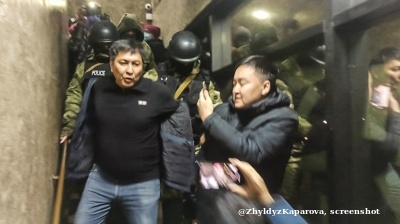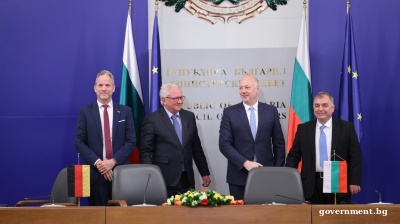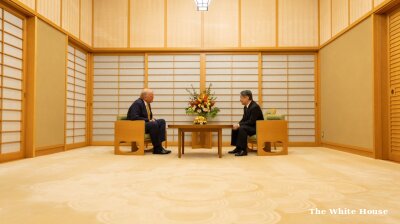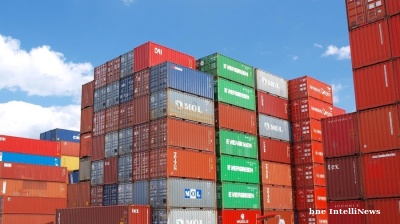An International Monetary Fund (IMF) team left Kyiv on November 22 without reaching a new staff level agreement with the government, although Ukrainian Prime Minister Oleksiy Honcharuk said significant progress has been made and the two sides are close to an agreement.
This was the second trip by the IMF team to Kyiv following the election of Ukrainian President Volodymyr Zelenskiy in April. Despite hopes for a quick deal that would upgrade Ukraine from a Stand-by Arrangement (SBA) to the more extensive and longer term Extended Fund Facility (EFF) worth several billion dollars, talks have floundered on concerns about the hold oligarch Ihor Kolomoisky has over the president, the independence of the National Bank of Ukraine (NBU) and the exclusion of foreigners from the mooted creation of a land market.
The IMF mission led by Ron van Rooden worked in Kyiv during September 12-26, but was unable to reach a deal.
"The authorities have requested a new IMF-supported programme to cover financing needs in the coming years. The mission has had productive discussions on policies for a new program, especially on fiscal and monetary policies, as well as key reform measures," Van Rooden said in a press briefing. "Discussions on the new programme will continue in the coming weeks.”
The exact size of the programme has yet to be determined but could be around $5bn-6bn, which would replace the standby arrangement of $3.9bn that formally remains in place and is due to expire at the start of next year.
“The mission made significant further progress in the discussions on policies and reforms that can underpin a new IMF-supported programme, including monetary, fiscal, and financial sector policies, as well as reforms to improve the business environment, strengthen the rule of law, and increase economic growth,” the Washington-based fund said in a statement.
The Zelenskiy has already managed to put through a raft of reforms that have been on the shelf for years as part of its hectic legislative programme that was launched when the government first took office. However, concerns over Kolomoisky's influence over the president remain a sticking point, as the oligarch has been using the legal system to try and force the government to return his PrivatBank that was nationalised in 2016.
To make things worse Kolomoisky said in an interview on November 22 that he was sure the bank would be returned to him “in the near future”. Zelenskiy has been vague on whether the bank will be returned, but as it became clear in the last month that there will be no IMF deal if PrivatBank is denationalised the president has released some more forceful statements.
The IMF has turned up the heat on the government by adding to its request for stronger assurances of the NBU's independence and no denationalisation of PrivatBank a demand that the government also try and recover some $15bn stolen by bank owners, including the $7.6bn stolen by Kolomoisky from PrivatBank.
Again with his back against the wall and facing a “no deal” scenario with the IMF, the president pledged "to make every effort" with the aim "to recover funds spent on compensation to the depositors of failed and nationalised banks, and capital top-up of the state banks due to unscrupulous debtors" on November 11.
The chances of recovering much money from the owners of the banks closed down or taken over by the NBU as part of its clean-up effort are low, banking experts tell bne IntelliNews. Funds need to be recovered or frozen in the first weeks after the bank is closed and the ability to recover the funds after that falls off exponentially. However, the IMF’s demand is also seen as targeting Kolomoisky in particular, as he has walked off with depositors money and is now appears to be acting with impunity.
Pushing through legislation to create a land market has also been high on the IMF’s wish-list, although this reform was postponed under the Poroshenko administration as it is a political hot potato.
The new government passed legislation last week to create the foundations of a land market, but also included laws restricting foreign participation. The IMF has objected to the restrictions which it says will reduce land prices and also allow local oligarchs to increase their share of land ownership.
Zelenskiy has said that after the land market is launched he intends to hold a referendum on easing the constrictions on foreign land ownership, once the market is established and working.
IMF gives Ukraine B+ plus report, but “must try harder”
The IMF awarded the Zelenskiy administration top marks for stabilising the economy since the collapse in 2014-15, but warned that growth is still below potential and wages are too low, which has led a fifth of the working aged population to leave the country in search of work elsewhere – mainly in Poland and Russia where some 5mn Ukrainians currently reside. The IMF laid out the details of the country’s successes and challenges in its press release, most of which we reproduce below.
“The economy is growing at a pace of 2.5–3.5%. Sound fiscal and monetary policies and exchange rate flexibility have resulted in a sharp reduction in Ukraine’s external and internal imbalances. The overall fiscal deficit has been limited to just above 2% of GDP in the last two years and is expected to remain at the same level this year,” the IMF team said in its statement.
“The energy sector’s quasi-fiscal deficit has been eliminated — a major accomplishment. Moreover, the current account deficit has fallen to 3-3.5% of GDP and reserves have recovered to over $20bn. Decisive efforts to restructure the banking system have been critical for economic stabilisation and the resumption of growth,” the IMF said.
“Growth is too low, however, to noticeably close the income gap with Ukraine’s neighbours. Per capita GDP (in PPP terms) in Ukraine is still very low — just 20% of the EU average, the second lowest level of all Central and Eastern European countries. Growth is held back by a weak business environment — with shortcomings in the legal framework, pervasive corruption, and large parts of the economy dominated by inefficient state-owned enterprises or by oligarchs — deterring competition and investment,” the IMF said.
“A regional comparison shows that the most significant differences in reform progress between Ukraine and its neighbours are in the quality of the legal institutional framework. While there has been progress in setting up new institutions to fight corruption, tangible results have yet to be achieved,” the IMF said.
“Because of the poor business environment, investment, and notably foreign direct investment, has been much lower in Ukraine than in other countries in the region. This lack of investment has limited productivity growth (labour productivity amounts to less than 10% of average productivity in EU countries), private sector job creation, and improvements in living standards, despite Ukraine’s well-skilled labour force. As a result, many workers seek job opportunities abroad,” the IMF said.
“Higher, sustainable and inclusive growth is needed for incomes in Ukraine to catch up to the levels seen in neighbouring countries. This will depend crucially on the implementation of ambitious reforms to support Ukraine’s transition to a full-fledged market economy. This is not an easy task and it has been a challenge in the past, when stop-and-go policies resulted in the repeated build-up of large imbalances and economic crises.
“Economic policies will need to be focused on maintaining macro-economic stability, while creating the conditions for achieving faster growth. Macro-economic stability is a sine qua non for realising faster growth. This requires maintaining prudent fiscal policies to ensure debt sustainability, while improving spending efficiency and outcomes — including in health care and education — and supporting vulnerable households through a well-targeted social safety net. It also means maintaining a cautious monetary policy, aimed at further reducing inflation and building reserves within a flexible exchange rate regime. And finally, it is crucial to safeguard financial stability, while strengthening financial intermediation and minimizing the cost to taxpayers from bank resolutions. Ensuring central bank independence is essential for implementing these monetary and financial sector policies,” according to the statement.
“Lifting the economy to a higher growth path also requires accelerating structural reforms. This includes most of all firmly establishing the rule of law — including through judicial reform — and decisively tackling corruption. Equally important are enhancing competition and opening up markets — particularly in the energy and agricultural sectors — and reducing the role of the state and oligarchs in the economy,” the IMF said.
“Wage growth needs to be consistent with improvements in labour productivity, to safeguard competitiveness. With sustained reform implementation, Ukraine can become more closely integrated with the European economy and its supply chains, taking greater advantage also of the Deep and Comprehensive Free Trade Agreement with the EU,” the IMF concluded.
News

US–South Korea investment deal on ice – for now
After a triumphant round of investment pledges in Tokyo, Donald Trump’s state visit to South Korea presents a far more challenging negotiation.

Kyrgyzstan bans three media titles as “extremist organisations”
Populist-nationalist president Sadyr Japarov, due to meet Donald Trump next week, denies introducing authoritarian controls.

Lula says Trump assured him of trade accord as US explores Brazil rare earths ties
Brazilian President Lula voiced optimism that his country will secure a trade agreement with the US following talks with President Trump, as Washington simultaneously stepped up engagement with Brazilian mining executives to discuss rare earths.

Bulgaria signs landmark deal with Rheinmetall to build ammunition plant
Investment reflects Bulgaria’s growing role in Europe’s rearmament drive and Nato’s efforts to strengthen regional defence supply chains and cut reliance on external suppliers.



